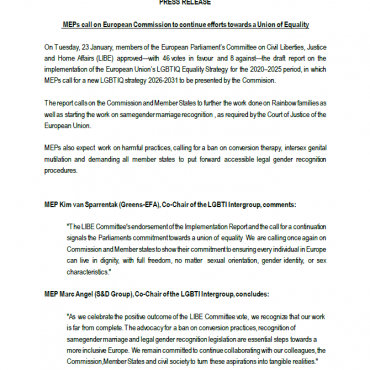MEPs call on Nigeria to abandon new homophobic Bill
On Monday the Parliament of Nigeria continued examining a draft law to outlaw celebrating same-sex marriage in the West African republic. Members of the European Parliament have expressed their dismay at the unnecessary proposal in a country that already punishes homosexuality with fines, imprisonment, and the death penalty.
 The National Assembly of the Federal Republic of Nigeria is examining the Same Gender Marriage Prohibition Bill. The draft law foresees three years of prison for those entering a marriage with someone of the same sex, or already in one. The Bill does not exclude tourists or expatriates in Nigeria. Those ‘witnessing, abetting and aiding the solemnization of same gender marriage’ face fines of up to 50,000 Nigerian naira (approximately EUR 230), and imprisonment for up to five years.
The National Assembly of the Federal Republic of Nigeria is examining the Same Gender Marriage Prohibition Bill. The draft law foresees three years of prison for those entering a marriage with someone of the same sex, or already in one. The Bill does not exclude tourists or expatriates in Nigeria. Those ‘witnessing, abetting and aiding the solemnization of same gender marriage’ face fines of up to 50,000 Nigerian naira (approximately EUR 230), and imprisonment for up to five years.
The draft law was already proposed and withdrawn in 2006, and later in 2008. It worries human rights defenders, as Nigeria already foresees some of the harshest punishment for homosexuality in the world including the death penalty. No groups have made public claims to same-sex marriage.
The Bill is likely to increase stigma and violence against lesbian, gay, bisexual and transgender people in the country, and obstruct HIV/AIDS work whilst over 3 million adults live with HIV (UNAIDS, 2009 estimate).
Ulrike Lunacek MEP, Co-president of the Intergroup on LGBT Rights, commented: “This Bill is based on the wrong idea that homosexuality is somehow ‘un-African’; but as with all other continents and times in human history, men have fallen in love with men and women with women. Regardless, the Bill doesn’t reflect the real situation in Nigeria where no one ever asked for same-sex marriages. I strongly call on our Nigerian sisters and brothers in the parliament to reject the Bill.”
Michael Cashman MEP, Co-president of the LGBT Intergroup, further added: “There is virtually no reason to adopt such a law. It will only serve to criminalise and stigmatise even more the very people already living at the margins of society. If this Bill passes, Nigeria should expect complications in its link with the EU and its Member States, including for development aid.”
The European Parliament has yet to ratify the revised Cotonou Agreement, which regulates the relationship between the EU and 79 countries in the African, Caribbean and Pacific group of states—including Nigeria.






